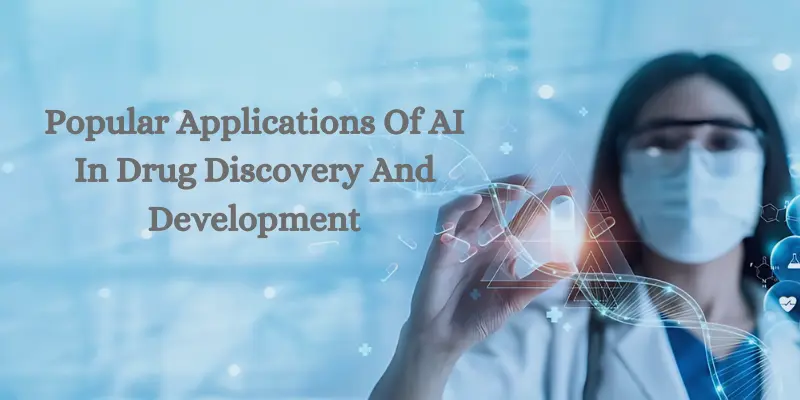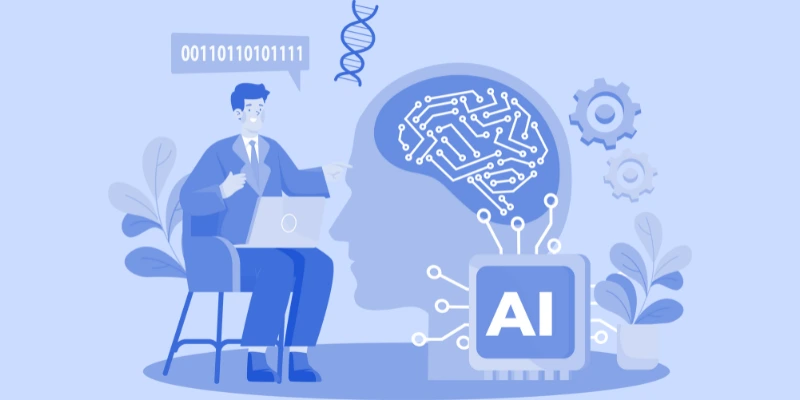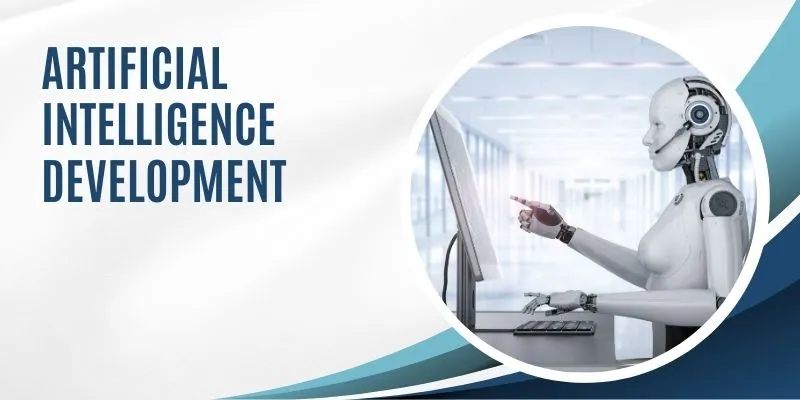Innovative drug discovery leads to life saving medications that help improve and prolong quality of life. Making a drug available to the market is a process that requires a vast amount of insight, along with data and rigorous tests to confirm quality and safety. The development of drugs is at the crossroads of a crucial time in which technology advancements and medical advancements are altering the traditional models.
The key to the change is AI Development Solutions, an instrument that has revolutionized the research and development of drugs. This seamless integration of AI can boost efficiency and speed research within a new age of personalized medical treatment. The integration of AI capabilities into big data-driven strategies can result in annual revenue that could reach $100 billion for the US health system. It involves leveraging predictive models and conducting thorough analyses of sensor data.
AI for drug discovery dramatically decreases the cost of drug discovery. The collaboration indicates that businesses may be able to reduce their expenses by 70% or more. In this article, we'll look at the potential of artificial intelligence to aid in the development of drugs and the ways in which these modern AI methods can revolutionize health care.
Understanding The Role Of AI in Drug Discovery And Development
Drug discovery research focuses on developing drugs that fight specific illnesses by positively impacting the body. Most researchers conduct extensive examinations of libraries of molecules to find a compound that can interact with an exciting molecule, particularly one associated with a specific illness. Then, those discovered molecules go through several tests to turn them into drugs.
Recent trends suggest a growing acceptance of rational and structure-based drug design techniques. These techniques do not skip the initial screening steps and require chemists to complete the creation, synthesis, and analysis of various substances to determine the possibility of developing innovative drugs.
The issue is the uncertainty of the chemical structure that has the desired biological effect and the features for the effective function of a drug. In the end, refining a compound's potential into potential drug candidates is time-consuming and resource-intensive. Recent data suggest that bringing an innovative drug to market today costs about $2.6 billion.
Furthermore, even if an innovative drug proves promising through laboratory testing, it will likely face obstacles during the trial phase. Trials in Phase I for those drug candidates have shown that 9.6 percent are effective in gaining market acceptance.
The capabilities for processing data of AI technology have received significant interest due to the difficulties they face. Researchers believe that AI Development Services to discover drugs can help speed the process and reduce expenses, acting as an accelerator. Market research firms have predicted potential savings exceeding $70 billion for discovering drugs in 2028 through AI.
Also Read : How Much Does It Cost To Build AI Software In USA 2024
Understanding The Drug Development Process
The development process for the drug begins with finding and validating a potential target. Targets are biological molecules (usually a gene or protein) that a drug binds directly to work. Most target proteins are. The proteins that have the perfect sites on which drugs can move and attach to perform the job they can do are known as druggable proteins.
The target proteins are identified during the discovery phase. In this process, an identified target protein sequence gets put into a computer. It searches for the most suitable drug among millions within the database of small molecules with the structure saved in the computer. This process presumes that the properties of the targeted protein and the drug are understood. If not, the computer employs models to determine the locations where a drug may be bound.
This process helps eliminate time-consuming laboratory tests that demand high-cost chemicals and reagents and have a high failure rate. After the suitable protein target and its target drug are determined, the study moves on to the preclinical stage, where the drugs are evaluated outside the biological environment by employing animals and cells to test their safety and toxicity.
In the next phase, which is part of the following clinical stage, the drug will be evaluated on a limited number of human subjects before being tested on a more significant number of patients. The drug is then subject to regulatory approval and post-market and marketing survey phases. Due to the substantial failing rate, the research phase is a time to limit the number of approved drugs before moving on to clinical and preclinical phases.
Also Read : Understanding The Generative AI Development Process 2024
How Can AI Assist In Speeding Up The Drug Development process?
AI is poised to change how target identification is conducted and better understand interactions between drugs and targets by dramatically cutting time, improving the accuracy of interactions between drugs and their targets, and making savings. The creation of two AI-powered prediction instruments, AlphaFold and RoseTTAFold, is a significant scientific discovery over the past four years in developing drugs using computation. Both of these tools are built upon deep neural networks. These neural networks utilize massive quantities of input data to create the desired output -- three-dimensional models of proteins.
The new versions from AlphaFold and RoseTTAFold, dubbed AlphaFold 3, enhance the capabilities of these tools to an altogether new height. The significant difference between new and earlier versions is that they can anticipate the static structure of proteins or protein-protein interactions. It also identifies interactions and structures for all combinations of proteins, DNA and RNA, modifications, tiny molecules, and particles. Furthermore, the updated versions employ generative diffusion-based models (one type model of AI model) for predicting structural complexes.
AI And Clinical Trials

AI-based technology is increasingly utilized in preclinical research and clinical trials. These technologies help companies increase the efficiency and accuracy of drug testing, speed up development, and improve outcomes. The most advanced algorithms can quickly review a vast database of chemical compounds to determine which ones are most likely to attach to a specific target. The algorithms can also determine an ingredient's potential toxicity and adverse effects, allowing researchers to concentrate their efforts on promising prospects.
AI assists in interactions with patients since it is a method of automated recruitment and data collection. The AI-based analysis provides information about patient behavior that can help researchers create clinical trials.
Modern pharmaceutical companies are employing AI to find patterns within the vast quantities of data collected by clinical research. The patterns could reveal specific trends that are hard to discern with traditional techniques. AI can analyze this information in real time, allowing researchers to spot trends quickly and decide what to do next with their clinical trials. What comes from this is improved pharmaceutical discovery, improved design, and more secure clinical trials, as well as better patient outcomes, all at lower expenses than ever before.
One of the most significant benefits of leveraging AI is its ability to uncover insights and extend existing knowledge beyond the capabilities of humans. Because clinical trials create an enormous amount of information and data, it is often difficult for researchers to go through the entire array of data to discover meaningful information. As an example, vital data may be hidden within knowledge silos, or acquired from experience, making it challenging to access or record.
To address this challenge, companies are using the capabilities of AI to offer more excellent information and knowledge that aids in improving collaboration and efficiency.
Benefits Of AI In Drug Development
The pharmaceutical industry has several major advantages from applying Custom AI Software Development to drug development and discovery.
Accelerated Drug Development
Since the advent of artificial intelligence in drug research and development, the process of finding potential drug targets can be significantly accelerated. Utilizing machine learning techniques, large data sets can be quickly examined, which leads to quick identification of possible candidate drugs. This speeds up streamlines lead discovery, saving precious time and funds for pharmaceutical researchers and companies.
More Effective Drugs
Artificial intelligence used in drug development and discovery plays a vital role in predicting the pharmacological qualities of lead compounds by analyzing their chemical structure. It makes drug development more efficient. With machine learning algorithms, scientists can construct predictive models that assess key property variables like bioavailability, solubility, and toxicity. The models can create new compounds with better pharmacological properties, increasing candidate drugs' effectiveness and security.
Improved Clinical Trial Design
In analyzing medical records and patient information online, AI streamlines patient recruitment by helping to identify the most suitable candidates quickly. Additionally, AI helps optimize trials by identifying segments that are more likely to be responsive to particular treatments. Utilizing AI-powered wearable devices permits continuous real-time monitoring, ensuring precise data records and modifying the trial protocol to ensure patient safety. Furthermore, AI algorithms facilitate robust data analysis, providing essential insights into future studies and practices in clinical practice.
Prediction Of Drugs' Bioactivity
AI in pharmaceutical R&D has transformed how we estimate drug bioactivity. Researchers are using AI to assess the bioactivity of various substances using methods such as QSAR, quantitative structure-activity relation (QSAR) modeling, and molecular docking.
The methods analyze substances' structure and chemical composition and how they interact with protein targets, leading to better estimations of their biological activities. Through deep learning, AI discovers complex connections and patterns within massive data sets, allowing precise estimation of unknown substances' bioactivity.
Quality Assurance
AI-based drug discovery plays a vital role in increasing the effectiveness and precision of various quality control processes within the pharmaceutical quality control field. By using computer vision algorithms to automate inspections, AI assists in identifying problems, contaminants, and packaging issues. It ensures that the drugs comply with high-quality requirements.
Additionally, AI algorithms analyze sensor information from equipment used in manufacturing, which allows predictive maintenance to ensure equipment is not damaged and reduces production downtime. AI can also assist in detecting fraud by analyzing distribution and sales data to detect suspicious patterns, thus ensuring the safety and security of the distribution channels used to distribute drugs.
Drug Repurposing
AI provides a viable approach for identifying new therapeutic uses that can be applied to existing medications. It not only drastically decreases the amount of time and money associated with conventional developing drugs but also allows for the discovery of applications for medicines already in use.
Through the analysis of large datasets of data on diseases and medications, AI algorithms can unveil patterns and relations, leading to the discovery of novel possibilities for treatment. In addition, the use of AI-driven networks in pharmacology permits the analysis of complex interactions between drug targets and diseases, allowing additional potential in existing drugs.
Drug Combination Analysis
AI's powerful analytical abilities can play an important role in studying complicated conditions that may require several drugs. By predicting the effects of collaboration and determining the best dose for different drug combinations, AI contributes to the formulation of more effective treatments.
In addition, AI assists in tailoring dosages for specific patients, considering their molecular and genetic traits, ultimately improving treatment efficacy and patient outcomes.
Patient Satisfaction
The use of AI to discover drugs proves useful for categorizing patients. It can help identify distinct categories of patients who share similar traits and disease histories. By utilizing predictive models and biomarker recognition, AI empowers healthcare providers to customize treatment plans that result in a better likelihood of success when developing new drugs and, ultimately, improve patient outcomes.
Also Read : Conversational AI vs Generative AI: Core Difference for CX
Popular Applications Of AI In Drug Discovery And Development

These are some of the applications of AI in drug discovery and development, which make procedures more straightforward than traditional approaches.
Target Selection And Validation
AI-powered drug discovery makes it easier to identify and verify potential molecular targets through the analysis of different datasets like Drug Information Banks and public libraries. By utilizing deep autoencoders, relief algorithms, and binary classification, AI-powered drug discovery efficiently identifies the areas of interest. In addition, AI platforms employ graph-convolutional networks and computer-generated models trained using cryo-EM microscopy data to understand proteins' structure better.
Compound Screening And Lead Optimization
In the area of screening compounds using AI, Artificial Intelligence-driven Virtual Screening allows for the practical identification of possible leads from the vast database of compounds. AI Retrosynthesis Pathway Prediction is an automated process for chemical syntheses that significantly improves the chemical synthesis process scheduling. Additionally, AI-based models for drug discovery have a significant role in classifying cell targets and enable the intelligent sorting of cells using images, resulting in faster cell separation.
Preclinical Studies
AI plays a crucial role in the molecular mechanisms of action and predicting dose-response relationships in pharmacokinetic/pharmacodynamic modeling. It effectively simplifies the evaluation of toxicology with its Deeptox Algorithm, which accurately anticipates a compound's toxic effects. In addition, deep-learning algorithms use transcriptomics data to predict chemical properties precisely.
Clinical Trials
AI instruments are crucial in clinical trials because they improve several critical aspects. They help detect diseases in patients, pinpoint specific gene targets, and predict the molecular consequences. Furthermore, AI-driven programs enhance medication adherence and allow the monitoring of risk, which results in higher efficiency and more tremendous success in clinical studies.
How Can Your Firm Use AI For Drug Development?
An important pharmaceutical firm aimed to establish itself as a top-five global innovator in drug development and clinical tests. Initially, they needed to measure their procedures and systems against best-in-class benchmarks. Bringing a brand-new product to market requires traversing a complicated and interconnected network of procedures with a wide range of stakeholders.
To speed up R&D, the pharma firm conducted an extensive six-week review of its complete workflow. More than 50 conversations with subject matter experts laid out various sub-processes, and high levels of maturity were rated in areas like measuring, friction in the data process, data utilization, and digitization.
The study revealed numerous process silos that stem from the absence of a system and gaps in information. Comparatively, to industry leaders, there were opportunities to improve by enhancing KPIs as well as data integration and modernization of the platform.
Through tangible data regarding friction points and roadblocks slowing down the pace of innovation, the company is able to make the necessary adjustments. The study on benchmarking gave the most honest assessment of the internal issues while providing a prioritized plan of action to improve efficiency.
Although no pharmaceutical firm has yet fulfilled AI's complete promise of accelerating time to market, significant progress is being made across the drug discovery funnel. Whether optimizing the preclinical molecular model, automating clinical trial protocols, improving manufacturing forecasts, or speeding regulatory submissions, AI creates incremental efficiency. The goal of industry leaders is to extend these incremental improvements into an integrated platform.
If you have good data practices and proper governance, AI and generative models will speed up every stage of the drug development process, from R&D through clinical trials to commercialization. The possibility of bringing lifesaving drugs to patients more quickly with the help of technology will be bright, even though adoption is slow instead of in a single day.
Challenges Of Using AI In Drug Discovery
AI holds tremendous promise to revolutionize drug discovery methods. However, several problems prevent seamless implementation and impede widespread adoption.
Data Privacy And Regulatory Compliance
The delicate nature of patient data raises questions regarding data privacy and regulatory conformity. To address concerns regarding ethical and legal aspects of AI-driven research and development, it is vital to adhere to the strictest laws regarding data protection, such as regulations governing data protection.
Data Quality And Quantity
The effectiveness of AI is greatly dependent upon the quality of data. When it comes to drug discovery, the data landscape often presents a problem. This is reflected in the lack of information, its diversity, and the different quality of the data. These characteristics create challenges for AI algorithms in analyzing this information.
Cost And Technical Expertise
Implementing AI for drug discovery will require substantial investments in financial resources and technical knowledge. This involves setting up and maintaining the infrastructure needed as well as actively recruiting high experts in data science and AI experts. These requirements require huge commitments, which create challenges for large-scale use.
Interpretability And Transparency
The complex nature of AI models can pose difficulties in interpretation and scalability. For success and credibility to exist, it is necessary to grasp the models and processes behind their establishment fully. This further aids in the increased use of AI in drug discovery.
Lack of Standardization
Drug discovery faces a significant challenge because no standardized methods for collecting data, data formats, or analysis methods exist. This lack of uniformity makes comparing research and data sets difficult. Therefore, AI encounters obstacles in creating reliable and consistent predictions and models.
Also Read : Generative AI: Expectations vs. Reality
Potential For AI acceleration In Drug Development
After organizations have completed the crucial work of creating and condensing their data resources into trusted, high-quality databases. They can use AI to improve the efficiency of their operations. That's where the true benefit comes in.
A single switch-on-and-off AI solution will not improve the whole drug development process in a matter of hours. AI Development Company must identify which areas of injecting artificial intelligence could yield the most benefit and continue to work on connecting the dots.
A few of the areas that show potential for AI advancement include:
-
-
GenAI models can quickly blend patient records or research archives and trials from the past to generate the first versions of protocols for trials in a single step. It can cut several months or weeks off the long documentation process.
-
The algorithms can determine which demographics are more likely to have high adhesion rates throughout clinical trials. Ensuring cohort retention pays dividends.
-
AI forecasting aids in balancing batch production for drugs, avoiding overproduction or waste.
-
Language models have the potential to automatically generate regulatory documents by using old submissions as examples. However, a firm can only partially automate reporting from beginning to end.
-
Identifying a handful of bounded, highly impactful domains for AI is essential instead of overhauling complicated processes simultaneously. Adding the modular improvement will increase efficiency across the entire drug development process.
Future Of AI In Drug Development
Pharma companies are now adopting AI strategies to reduce the enormous financial burden and possible setbacks associated with conventional Virtual Screening (VS) methods. The shift in strategy is evident in the impressive increase in the AI market.
There's no doubt that AI will play a more active role in drug development. The systems must continuously "learn and improve." Ultimately, it's an issue of having an individual "make and test the molecules they suggest" and give feedback on their findings to the computer. AI is still required to prove itself fully, and the effectiveness of its application in drug development will only be determined via human-based studies.
The more advanced AI-generated medicines will require different regulations to ensure that the development and testing guidelines are in check. Evidence suggests these AI drugs have been "fast approaching," and "drug regulators must step up to meet the challenge. The following decades could "demonstrate conclusively" whether AI-developed products will be as efficient as some have predicted. However, ultimately, "incremental improvements" in drug development "could still be a real boon" for humanity.
Conclusion
AI in drug development and discovery can revolutionize pharmaceutical manufacturing and health sector practices, speeding up drug discovery processes while improving clinical trial designs, anticipating bioactivity patterns, predicting bioactive drug effects accurately, assuring quality production processes, and speeding up drug production times. As a leading AI development company, we provide more efficient, affordable, and practical solutions that enable breakthroughs in the healthcare field and the creation of life saving therapies.
If you want to enhance your healthcare software using the most advanced AI techniques, please get in touch with JPLoft. Begin your healthcare revolution journey with us! Our expert team is focused on offering tailored solutions that transform healthcare.













Share this blog